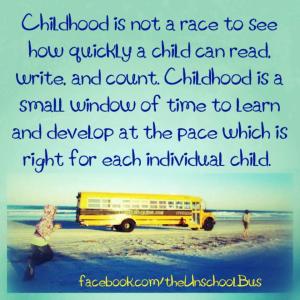I was recently observing in a classroom, having being alerted to a child who, at 5 years old, was struggling to complete the tasks expected of her by the teacher. In fact, in the teacher’s eyes, she was being ‘non-compliant’. As I observed, the child self-selected a task outside of what the teacher had asked her to do. As the teacher moved to intervene, she stated to the child “No, we are not playing now, we are learning”. I was absolutely stunned. This teacher, in one sentence had managed to contradict the very nature of childhood. That learning and play are two separate entities, and that one must certainly not engage in play (and presumably any frivolity that comes with it) when one is committed to the serious task of learning.
This seems to be the prevailing attitude of our current education system. What stunned me the most with this teacher was that she was young and trained in a degree that covers a student age of 3-8 years of age. I had assumed that this meant she would have a clear understanding of the work of children, and the literature and research around the importance of play and the subsequent learning that comes from this. I am forever learning not to assume anything in my work. There seems to be a belief by society in general that up to the age of 5 years, children can have a bit of a play – a bit of a lark about – but come time for school then that nonsense really has to cease in favour of the important stuff. The real learning. The ‘get-ready-for-NCEA’ attitude narrow-minded focus. It does seem to feel like childhood is a very endangered species.
What is a shame even more than this, however, is that this focus is starting to seep into many early childhood facilities. Daycare facilities are now re-branding themselves as ‘Educare’ companies, offering to ‘prepare your child’ for school. While I am all in favour of having children school-ready, it is the definition of this that concerns me the most. School ready should encompass a level of socialisation, independence, level of oral language and an understanding of the reasons why we go to school. When a 3 year old is expected to be compliant in the ‘classroom’, this is displaying an ignorance about child development that is difficult to stomach. Companies responsible for the provision of care to children under the age of 5 should take their responsibilities extremely seriously. They are in the position of preserving childhood, not extinguishing it in favour of the pressure to have children learning the ‘important stuff’. They should be advocates for the children they care for, teaching parents and the wider community about the important life-long learning that occurs in these early years, and how we, as families, can assist our children with their milestones. And above all, they should work hard to correct society’s perception that earlier is better. That if children are pushed harder, sooner, they will be achieving quicker and better. And when they get to school at 5, they won’t bother with all this play stuff – they will be busy doing actual learning.
What 5 year olds need, particularly when they have come through a system such as an Educare facilities, is time to explore, discover, create and connect with the world around them. To inquire. To question. To delight and to consider. Of all the ‘subjects’ of childhood – play encompasses all these skills. And so much more. At 5, students should be in classrooms that have the flexibility to encourage students in their play, not to stop them at the first step. That are resourced enough to allow children to explore their ideas and create from their imaginations. This is not in conflict with the need to have children learning to read, write and develop their numeracy skills. But if in an environment where children are engaged in true play, these tools will be used in context and with purpose. Children will have real reason to draw on and develop these skills. They will be learning through their play, not separately from their play.

















